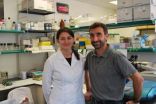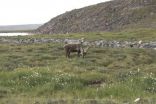(Press-News.org) MANHATTAN, KANSAS -- Why does the word "dog" have meaning? If you say "dog" to a friend, why does your friend understand you?
Kansas State University philosopher Elliott Wagner aims to address these types of questions in his latest research, which focuses on long-standing philosophical questions about semantic meaning. Wagner, assistant professor of philosophy, and two other philosophers and a mathematician are collaborating to use game theory to analyze communication and how it acquires meaning.
"If I order a cappuccino at a coffee shop, I usually don't think about why it is that my language can help me communicate my desire for a cappuccino," Wagner said. "This sort of research allows us to understand a very basic aspect of the world."
The researchers' latest work appears in the scientific journal Proceedings of the National Academy of Sciences of the United States of America, or PNAS, in the article "Some dynamics of signaling games." It is rare for philosophy research to appear in the scientific journal, Wagner said. Collaborators include two other philosophers — Simon Hutteggar and Brian Skyrms — from the University of California, Irvine, as well as mathematician Pierre Tarres of the University of Toulouse in France.
The researchers are using evolutionary game theory models to understand how words and actions acquire meaning through natural processes, whether through biological evolution, social learning or other adaptive processes.
Game theory is a branch of mathematics that creates mathematical abstractions of social interactions and communication. Communication involves two agents — a sender and a receiver. The sender shares a message with the receiver through a sign or signal and the receiver uses the signal to act in the world. This interaction is called a signaling game.
The researchers used signaling games to study information flow in the natural world, which happens at all levels of biological organization, Wagner said. For example, bacteria such as those in the genus Pseudomonas communicate through chemical signals to attack the human immune system. Monkeys use vocalization to talk with each other. A peacock uses the size of his tail to signal his attractiveness to a female. People use gestures and language to communicate.
While these types of models have existed since the 1970s, Wagner and collaborators studied the dynamics of signaling games. The researchers incorporated evolution and individual learning to overturn other preconceived notions from previous models.
Through these models, the researchers start with a signaling game in which the sender's message does not have any prebuilt meaning. As the signaling system evolves, the sender's message may reflect the state of the world and the receiver may respond in a way that is appropriate for the state of the world.
"Through this process an arbitrary signal with no prebuilt meaning has come to mean something," Wagner said. "It appears that the meaning of a word has almost magically arisen out of this natural process."
If the researchers can show that this process occurs across a wide variety of models, then they may be able to explain how a word or action gains meaning.
"I think it's important for us to think carefully about features of our lives that we take for granted," Wagner said. "This research is one way for us to think carefully about why it is that words have meaning and how it is that words can acquire meaning through a natural process."
INFORMATION:
The National Science Foundation has supported the work. The researchers plan future studies and to expand their analysis to a wider class of signaling games.
Philosopher uses game theory to understand how words, actions acquire meaning
2014-07-21
ELSE PRESS RELEASES FROM THIS DATE:
New technique uses 'simulated' human heart to screen drugs
2014-07-21
A Coventry University scientist has developed a pioneering new way – using samples of beating heart tissue – to test the effect of drugs on the heart without using human or animal trials.
The breakthrough is the work of Dr Helen Maddock – an expert in cardiovascular physiology and pharmacology from the University's Centre for Applied Biological and Exercise Sciences – and could lead to the lives of hundreds of future patients being saved and the quality of their treatments improved.
Adverse effects of drugs on the cardiovascular system are a major cause of many medical ...
Age-related macular degeneration occurs much earlier than previously assumed
2014-07-21
It is widely accepted that age-related macular degeneration (AMD) is the most common cause of visual impairment and blindness in industrialized countries. However, it is questionable whether it can continue to be defined as a disease in people in their 50s and beyond. Investigations to determine the incidence of age-related macular degeneration undertaken as part of the Gutenberg Health Study of the University Medical Center of Johannes Gutenberg University Mainz (JGU) have shown that even persons under the age of 50 years may be affected by an early form of the eye disease. ...
Our daily bread
2014-07-21
Bread wheat (Triticum aestivum L.) is the most widely cultivated cereal crop in the world and provides 20 percent of the food calories consumed by humans. A polyploid species, hexaploid bread wheat contains six duplicated copies of its genome and is more than five times larger than the human genome. This makes genome research in wheat particularly difficult.
Dr. Klaus Mayer, Head of the Research Unit Plant Genome and Systems Biology at HMGU, in collaboration with his colleagues Matthias Pfeifer, Dr. Karl Kugler and Manuel Spannagl, succeeded in gaining insights into complex ...
Described novel regulator of a protein inactive in over 50 percent of human tumors
2014-07-21
Researchers at the Bellvitge Biomedical Research Institute (IDIBELL) and the University of Barcelona have discovered the interaction between HERC2 proteins with another protein called p53 that is inactivated in more than half of human tumors. The study results were published in the Journal of Biological Chemistry.
Regulation of the activity of p53 by HERC2
The team of José Luis Rosa, at the growth factors and cell differentiation research group at IDIBELL studies the molecular mechanisms of HERC family proteins. These proteins are ubiquitin ligases that regulate the ...
Potential new flu drugs target immune response, not virus
2014-07-21
The seriousness of disease often results from the strength of immune response, rather than with the virus, itself. Turning down that response, rather than attacking the virus, might be a better way to reduce that severity, says Juliet Morrison of the University of Washington, Seattle. She and her collaborators have now taken the first step in doing just that for the H7N9 influenza, and their work has already led to identification of six potential therapeutics for this highly virulent strain. The research is published ahead of print in the Journal of Virology.
"We set ...
More than glitter
2014-07-21
A special class of tiny gold particles can easily slip through cell membranes, making them good candidates to deliver drugs directly to target cells.
A new study from MIT materials scientists reveals that these nanoparticles enter cells by taking advantage of a route normally used in vesicle-vesicle fusion, a crucial process that allows signal transmission between neurons. In the July 21 issue of Nature Communications, the researchers describe in detail the mechanism by which these nanoparticles are able to fuse with a membrane.
The findings suggest possible strategies ...
Mammals metabolize some pesticides to limit their biomagnification
2014-07-21
The concentrations of many historically used, and now widely banned, pesticides and other toxic chemicals—called legacy contaminants—can become magnified in an animal that eats contaminated food; however, a new Environmental Toxicology & Chemistry study has found that Arctic mammals metabolize some currently used pesticides, preventing such 'biomagnification.'
Researchers who studied the vegetation-caribou-wolf food chain in the Bathurst region of Canada say that currently use pesticides enter the food chain and become concentrated in vegetation, but the evidence shows ...
Examining the causes of a devastating debris flow
2014-07-21
Storm-triggered landslides cause loss of life, property damage, and landscape alterations. For instance, the remnants of Hurricane Camille in 1969 caused 109 deaths in central Virginia, after 600 mm of rain fell in mountainous terrain in 6 hours. More recently, on 8 August 2010, a rainstorm-induced landslide devastated the Chinese county of Zhouqu, causing more than 1000 deaths. A new modeling study by Ren (Geophysical Research Letters) examines the multiple factors, both natural and human caused, that came together to produce this event. The triad of storm-triggered landslides ...
New research links bad diet to loss of smell
2014-07-21
TALLAHASSEE, Fla. — Could stuffing yourself full of high-fat foods cause you to lose your sense of smell?
A new study from Florida State University neuroscientists says so, and it has researchers taking a closer look at how our diets could impact a whole range of human functions that were not traditionally considered when examining the impact of obesity.
"This opens up a lot of possibilities for obesity research," said Florida State University post-doctoral researcher Nicolas Thiebaud, who led the study examining how high-fat foods impacted smell.
Thiebaud led the ...
Study provides insights into birds' migration routes
2014-07-21
By tracking hybrids between songbird species, investigators have found that migration routes are under genetic control and could be preventing interbreeding. The research, which is published in Ecology Letters, was conducted using geolocators that, like GPS, record the position of a bird and allow its long distance movement to be tracked.
Compared with their parents, hybrids exhibited increased variability in their migratory routes: some used intermediate routes across less suitable areas, while others used the same routes as one parental group on fall migration and the ...




